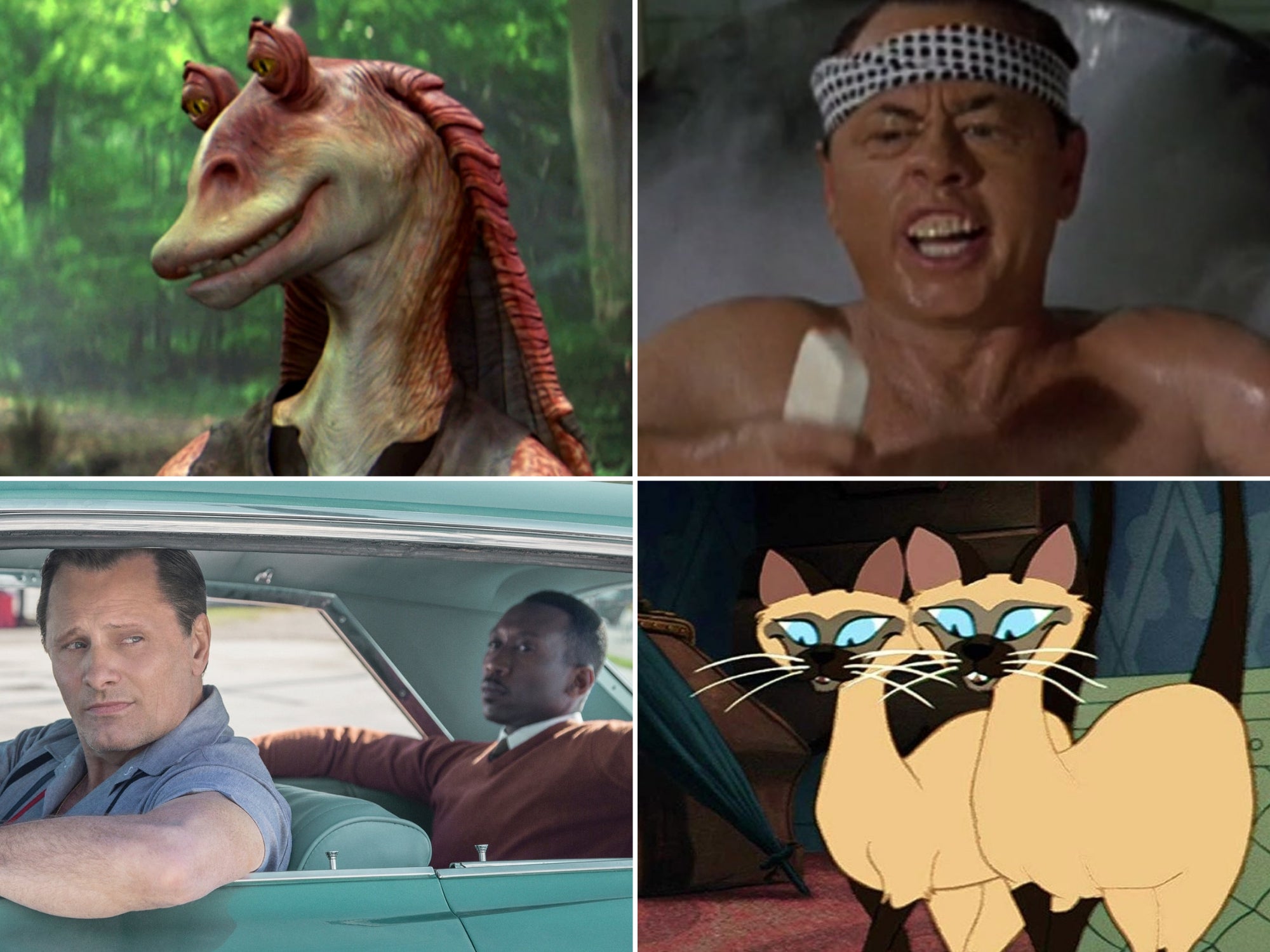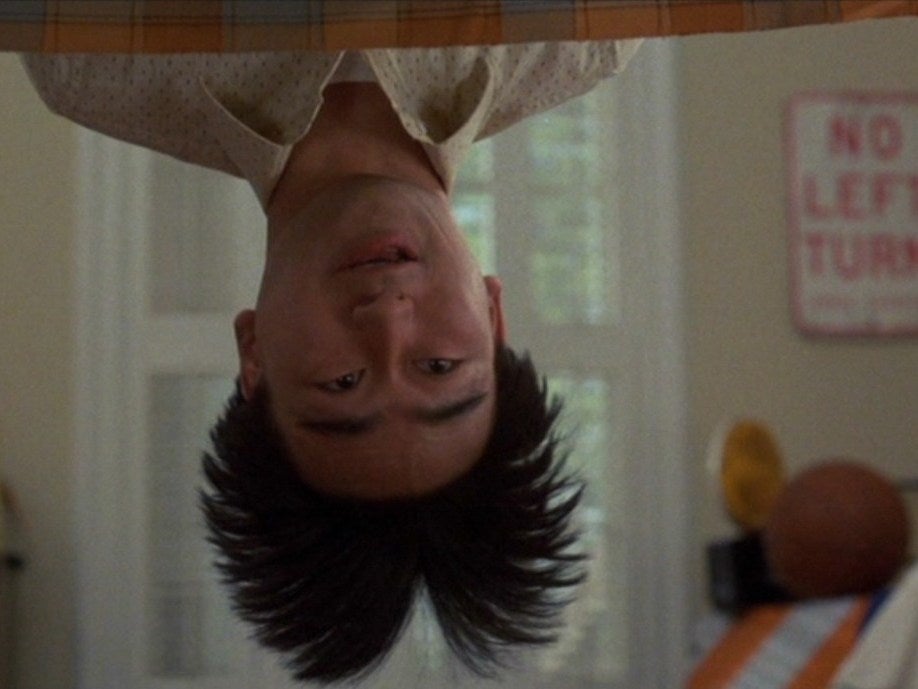The Independent's journalism is supported by our readers. When you purchase through links on our site, we may earn commission.
Gone with the Wind and beyond: 9 films that were trailed by racist controversy
As ‘Gone with the Wind’ disappears from a US streaming platform following decades of controversy, Adam White selects nine movies trailed by similar criticism


A reckoning over racist entertainment has emerged in recent days. Little Britain has been axed from BBC iPlayer. Gone with the Wind has been temporarily pulled from the fledgling US streaming platform HBO Max. The international Black Lives Matter protests haven’t just targeted police brutality and systemic racism, but the long shadow of racism hanging over popular culture and the media – the jokes designed to hurt, the films that glorified racism of the past and the stars previously permitted to go unquestioned about their own racist behaviour.
What often goes unspoken, however, is that little of this is new. The likes of Little Britain and Gone with the Wind have always been condemned for trafficking in racist tropes, whether for their use of blackface or yellowface, or their romanticisation of the confederacy. Only now are people in positions of power finally beginning to listen.
There will probably be more to come. Hollywood history is overwhelmed by stories that hinge on racist stereotypes and hatred of minority groups, much of which has folded into the fabric of society at large. From classic Disney films to recent Oscar winners, here are nine of the strangest and most offensive movies we’d be better off forgetting.
Lady and the Tramp (1955)
The Disney classic features a musical sequence in which two Siamese cats, voiced by Peggy Lee using a stereotypical and nondescript “Asian” accent, reveal themselves to be sly and untrustworthy, their eyes morphing into slits. Like a number of animated touchstones from the early years of Disney, it’s a moment of easily forgettable racism in an otherwise cheery movie. If you stream it on Disney+ today, a warning appears: “This program is presented as originally created. It may contain outdated cultural depictions.” The film’s live-action remake, released in 2019, excised the sequence completely.
Song of the South (1946)
This list could quite easily be nothing but old Disney movies, some of the most egregious elements being Dumbo’s jive-talking crows or the unpleasant depiction of Native Americans in Peter Pan. But they’re also easily viewable, if sporting content warnings. Song of the South is so racist that it’s almost impossible to find today. The apparently inspirational tale of two white children taught about the wonders of life by an elderly slave they own, it depicts plantation life as wholesome, and slavery as something charming and idyllic. Unsurprisingly, it has never been released on home video in the US, with only low-quality copies available on the black market.
Breakfast at Tiffany’s (1961)
Another horrible blight on an otherwise cheery movie is Mr Yunioshi, landlord to Audrey Hepburn’s girl about town in Breakfast at Tiffany’s. Played by Mickey Rooney, the character has long been regarded as the most high-profile example of Hollywood yellowface, the actor coated in bronzer and sporting false teeth and speaking in an exaggerated “Asian” accent. Producer Richard Shepard has admitted in recent years that the racism of the character spoils the movie. Rooney, however, always expressed bafflement that there was any controversy over his portrayal. “Never in all the more than 40 years after we made it – not one complaint,” he said in 2008.

Sixteen Candles (1984)
Buried in this John Hughes teen classic is the character of Long Duk Dong, a foreign exchange student who appears on screen soundtracked by a loud gong noise. Sex crazed and culturally ignorant, the character speaks with an exaggerated “Asian” accent and broken English, and faced criticism from Asian-American groups at the time. In 2018, Sixteen Candles star Molly Ringwald expressed horror at watching the film through a modern lens, noting that Long Duk Dong is “a grotesque stereotype”.
The Love Guru (2008)
This forgotten comedy was a doomed attempt by Mike Myers to create a character as memorable as Austin Powers. Instead, it sparked complaints of racism. Myers avoided brownface when playing a mystical Hindu guru named Pitka, but that’s about the only positive thing about his work here. It otherwise traffics in Hindu stereotypes and deliberately mangles sacred Hindu terms for cheap laughs, as in substituting “Namaste” for “Mariska Hargitay” – the star of TV’s Law & Order: Special Victims Unit.
Star Wars: Episode I – The Phantom Menace (1999)
The Phantom Menace was maligned for a number of reasons, but most intriguing was the criticism it received for its coded racism. Jar Jar Binks, a lazy, clumsy alien with a thick, generic Caribbean accent, was condemned by a number of critics as a racist stereotype akin to the stars of historic minstrel shows. Watto, a greedy slave owner alien with a hooked nose, beady eyes and a hat some argued to be reminiscent of a yarmulke, was also criticised for being an anti-semitic caricature.
Passion of the Christ (2004)
Mel Gibson’s smash hit drama, chronicling the hours before Christ’s crucifixion, was beset by claims of anti-semitism even before it hit cinemas. It depicts Christ’s enemies as a volatile cabal of bloodthirsty Jews. Even as many critics questioned its historical accuracy and its depiction of the Jewish faith, Gibson defended his film. Gibson’s own arrest in 2006, in which he ranted about “f***ing Jews [being] responsible for all the wars in the world”, only added to the unease.
Soul Man (1986)
Screened for President Ronald Reagan at the White House, this college comedy saw a white teenager disguise himself as a black student in order to qualify for a scholarship to Harvard. Maligned by critics at the time, it was also condemned by the NAACP and black student groups across the US. Actor Rae Dawn Chong, who appears in the film, blamed Spike Lee, one of the film’s most high-profile detractors, for the backlash. “Our little film was maligned by the black community led by a jealous Spike Lee,” she said in 2015, “who has never seen the film.”
Green Book (2018)
The 2019 Best Picture Oscar winner was released amid a wave of controversy about its depiction of the late jazz musician Don Shirley. As well as being accused of misrepresenting Shirley’s relationship with his family, critics also claimed that the film rested on a “white saviour trope” – it is the story of a racist white man who is taught the error of his ways by a kindly black man he is forced to spend time with and protect from other racists. “A neutered black man needs a white guy not only to protect and serve him, but to love him, too,” wrote critic Wesley Morris in a withering takedown of the film in The New York Times.
Join our commenting forum
Join thought-provoking conversations, follow other Independent readers and see their replies
Comments
Bookmark popover
Removed from bookmarks